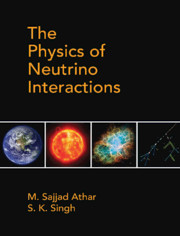Book contents
- Frontmatter
- Dedication
- Contents
- List of Figures
- List of Tables
- Preface
- Acknowledgments
- Chapter 1 Neutrino Properties and Its Interactions
- Chapter 2 Relativistic Particles and Neutrinos
- Chapter 3 Quantization of Free Particle Fields
- Chapter 4 Interacting Fields and Relativistic Perturbation Theory
- Chapter 5 Phenomenological Theory I: Nuclear β-decays and Weak Interaction of Leptons
- Chapter 6 Phenomenological Theory II: Weak Decays of Hadrons
- Chapter 7 Gauge Field Theories and Fundamental Interactions
- Chapter 8 Unified Theory of Electroweak Interactions
- Chapter 9 Neutrino and Electron Scattering from Point Particles
- Chapter 10 Neutrino scattering Cross Sections from Hadrons: Quasielastic Scattering
- Chapter 11 Neutrino Scattering from Hadrons: Inelastic Scattering (I)
- Chapter 12 Neutrino Scattering from Hadrons: Inelastic Scattering (II)
- Chapter 13 Neutrino Scattering from Hadrons: Deep Inelastic Scattering
- Chapter 14 Weak Quasielastic v(⊽)-nucleus Scattering
- Chapter 15 Inelastic Scattering of (Anti)neutrinos from Nuclei
- Chapter 16 Deep Inelastic Scattering of (Anti)neutrinos from Nuclei
- Chapter 17 Neutrino Sources and Detection of Neutrinos
- Chapter 18 Neutrino Mixing and Oscillations
- Chapter 19 Neutrino Astrophysics and the Synthesis of Elements
- Chapter 20 Neutrino Interactions Beyond the Standard Model
- Appendices
- Appendix A Lorentz Transformation and Covariance of the Dirac Equation
- Appendix B Cabibbo Theory
- Appendix C Some Properties of Pauli and Dirac Matrices and Spin Density Matrices
- Appendix D Leptonic and Hadronic Tensors
- Appendix E General Expression for the Total Scattering Cross Section and Decay Rates
- Appendix F Expressions of N(q2), the Coefficients of the Polarization Observables
- References
- Index
Chapter 14 - Weak Quasielastic v(⊽)-nucleusScattering
Published online by Cambridge University Press: 22 May 2020
- Frontmatter
- Dedication
- Contents
- List of Figures
- List of Tables
- Preface
- Acknowledgments
- Chapter 1 Neutrino Properties and Its Interactions
- Chapter 2 Relativistic Particles and Neutrinos
- Chapter 3 Quantization of Free Particle Fields
- Chapter 4 Interacting Fields and Relativistic Perturbation Theory
- Chapter 5 Phenomenological Theory I: Nuclear β-decays and Weak Interaction of Leptons
- Chapter 6 Phenomenological Theory II: Weak Decays of Hadrons
- Chapter 7 Gauge Field Theories and Fundamental Interactions
- Chapter 8 Unified Theory of Electroweak Interactions
- Chapter 9 Neutrino and Electron Scattering from Point Particles
- Chapter 10 Neutrino scattering Cross Sections from Hadrons: Quasielastic Scattering
- Chapter 11 Neutrino Scattering from Hadrons: Inelastic Scattering (I)
- Chapter 12 Neutrino Scattering from Hadrons: Inelastic Scattering (II)
- Chapter 13 Neutrino Scattering from Hadrons: Deep Inelastic Scattering
- Chapter 14 Weak Quasielastic v(⊽)-nucleus Scattering
- Chapter 15 Inelastic Scattering of (Anti)neutrinos from Nuclei
- Chapter 16 Deep Inelastic Scattering of (Anti)neutrinos from Nuclei
- Chapter 17 Neutrino Sources and Detection of Neutrinos
- Chapter 18 Neutrino Mixing and Oscillations
- Chapter 19 Neutrino Astrophysics and the Synthesis of Elements
- Chapter 20 Neutrino Interactions Beyond the Standard Model
- Appendices
- Appendix A Lorentz Transformation and Covariance of the Dirac Equation
- Appendix B Cabibbo Theory
- Appendix C Some Properties of Pauli and Dirac Matrices and Spin Density Matrices
- Appendix D Leptonic and Hadronic Tensors
- Appendix E General Expression for the Total Scattering Cross Section and Decay Rates
- Appendix F Expressions of N(q2), the Coefficients of the Polarization Observables
- References
- Index
Summary
Introduction
In Chapters 10–13, we have discussed (anti)neutrino interactions onthe free nucleon target leading to quasielastic (Chapter 10), inelastic(Chapters 11 and 12), and deep inelastic scattering (Chapters 13) dependingupon the energy transferred to the target and the four-momentum transfersquared. The study of such processes is important to understand the variousbasic weak interaction processes induced by (anti)neutrinos from the freenucleons and determine the quasielastic form factors, transition formfactors, and the structure functions of the nucleon at the W NN(ZN N) vertex. In recent times, the study of(anti)neutrino reactions from the nuclear targets has been emphasized asalmost all the present generation (anti)neutrino experiments use moderate toheavy nuclear targets like 12C, 16O, 40Ar,56Fe, 208Pb, where the interactions take placewith the nucleons that are bound inside the nucleus. Various experimentslike MINERvA, NOvA, T2K, etc., are being performed in the few GeV energyregion where the contribution to the scattering cross section comes from allthe possible channels, viz., quasielastic, inelastic, and deep inelasticscattering processes. A good understanding of the nuclear cross sectionswould be very helpful in analyzing these experiments. The precision withwhich the basic neutrino–nucleon cross sections in nuclear targetsare known is still not better than 20–30%.
Neutrino oscillation experiments measure events that are a convolution of
(i) energy-dependent neutrino flux and
(ii) energy-dependent cross section.
Moreover, the nuclear medium effects modulating the cross sections are energydependent. Therefore, it is highly desirable that we understand the energydependence of nuclear medium effects in neutrino scattering processes; thisunderstanding will help in achieving the future goals of physicists involvedin studying CP violation and the mass hierarchy problem in the phenomenologyof neutrino oscillations (Chapter 18).
Broadly, we may divide nuclear processes induced by neutrinos into twocategories. The first one is the exclusive reactions
where Zi (Z f ) isthe charge of initial (final) nucleus. In this case, the final nucleus isleft either in the ground state or in an excited state, which decays intosome final nuclear states through electromagnetic or weak interactions byemitting photons or charged leptons which are observed.
- Type
- Chapter
- Information
- The Physics of Neutrino Interactions , pp. 561 - 602Publisher: Cambridge University PressPrint publication year: 2020



